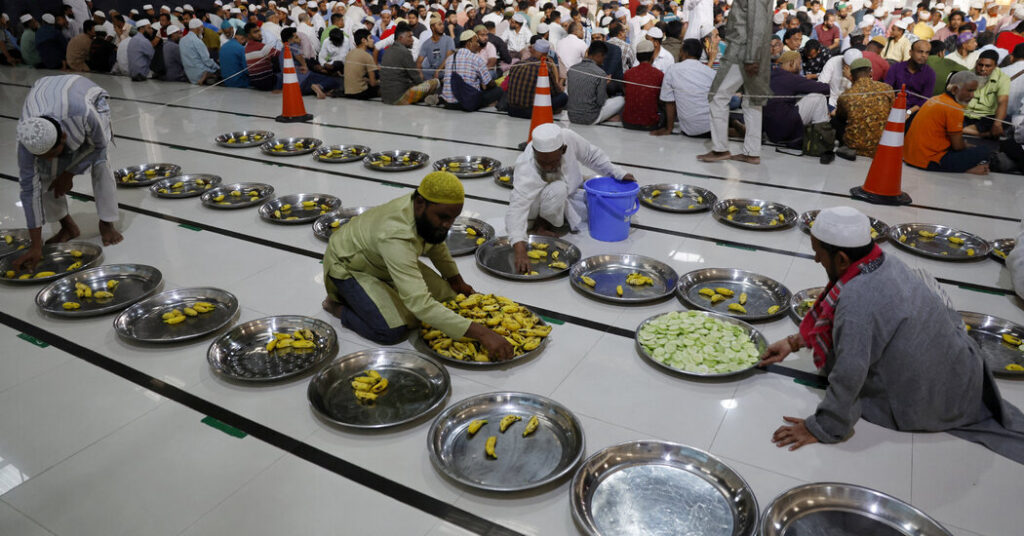Around sunset during the Muslim fasting month of Ramadan, something remarkable happens in the Bangladeshi capital, Dhaka. The streets in this city of more than 10 million people, known for its hectic bustle and choking traffic, turn quiet and empty.
But for political parties, which know well the persuasive powers of full bellies, sunset is their high time.
Iftar parties, where the faithful break their fast, were closely watched through the end of Ramadan last week for what direction Bangladesh could take after the overthrow of its authoritarian leader last summer.
Who was attending which party? Who was seated next to whom? In Bangladesh’s political vacuum, the answers to those questions offered clues to how new alliances could form and even the direction of changing geopolitical winds.
To gauge the political temperature, we got ourselves invited to one.
It was hosted at a rooftop restaurant by Gono Odhikar Parishad, a small party born of an earlier wave of student protests in 2018, before the one last year that toppled Prime Minister Sheikh Hasina.
The party had made arrangements for 600 people, and 900 showed up. Plates of fried snacks and sweets were passed around. Waiters kept the yogurt drinks flowing.
There was one thing no one seemed to have thought about: How do you get hundreds of people who have not eaten or hydrated for 15 hours to the top floor? Definitely not by climbing eight flights of stairs.
The crowd, teeming in the tiny lobby painted like van Gogh’s “Starry Night,” tried to squeeze into one elevator with a capacity of 18 people.
The elevator’s operator — which remains a thing in this part of the world — had a difficult job. A gentle man with a beard dyed red, he sat on a plastic stool by the buttons. He loaded every trip with the precision of a shopkeeper weighing grapes, offloading bodies one by one until the elevator was no longer over capacity.
At the top, the restaurant heaved with people.
Dozens of tables were marked RESERVED FOR POLITICAL PARTIES or RESERVED FOR JOURNALISTS. It was mostly men, with a sprinkling of women.
Sangeeta Huq, a leader of the young party’s youth division, said she had attended five iftar parties in the first two weeks of Ramadan.
“Each wing, each division of our own party has an iftar party — youth wing, labor wing, human rights wing,” she said.
From the podium in front of her, speech after speech was directed less at the fasting guests and more at the couple dozen cameras. The theme was clear: The country needed an election.
The timing of that election is at the heart of a political divide. Some want it right away. Others want reforms first, to avoid a repeat of past rigged votes.
Dominating the news, and naturally the chatter at iftar parties, was the unease between Bangladesh’s military and the student-driven interim government.
The students are increasingly suspicious of the army chief, Gen. Waker-uz-Zaman. Some think that the general, a relative of Ms. Hasina, the ousted prime minister, is trying to open space for a revival of her deposed party.
Others suspect that the army chief is pressing for early elections because he has cut a deal with Ms. Hasina’s longtime opposition, the Bangladesh Nationalist Party, or B.N.P.
Leaders of that party, on the other hand, suspect that the students are using their sway over the government, and on the streets, to delay the election in order to buy time and organize as a political force themselves.
Another big topic in Dhaka was where India — the giant neighbor that long supported Ms. Hasina and has now given her shelter — stood in all the political jostling.
New Delhi broadly pinned Ms. Hasina’s downfall on what it called a conspiracy between the B.N.P. and Jamaat-e-Islami, the main Islamist party, painting them both as extremist.
But in a sign of changing times, Indian diplomats showed up at iftar gatherings for both parties.
“Very busy time,” said Mia Golam Parwar, Jamaat’s general secretary, whose schedule during Ramadan revolved around iftar parties. “We feel like this is our high time.”
He boasted that 39 diplomatic missions had been represented at Jamaat’s iftar party.
Just around the corner from Gono Odhikar’s rooftop event, a local branch of the B.N.P. was hosting its own iftar party under a tent in a schoolyard.
People sat at round tables as biryani boxes and soda cans were unloaded from a truck. A loudspeaker on the main road blared the names of the dozens of dignitaries in attendance.
When the local B.N.P. leader, Ariful Islam Arif, took his turn at the mic on a crowded stage decked out in flowers, he got emotional.
“I missed this for seven years because I was in jail,” he said.
Saif Hasnat contributed reporting.
https://www.nytimes.com/2025/04/01/world/asia/bangladesh-politics.html


